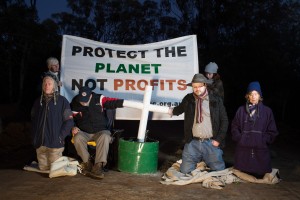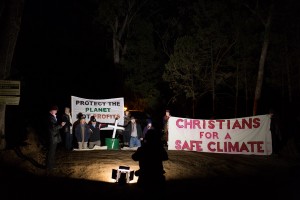
Christians for a safe climate
On a cold June morning in Maules Creek in northern NSW, a group of Christians, including three ministers and two grandmothers from four denominations locked themselves onto a structure in the shape of a cross. The area, located in the Leard State Forest, has been selected by Whitehaven Coal for a new open-cut coal mine which will reportedly emit 30 million tonnes of CO2 per year and threaten water supplies, endangered ecosystems and Indigenous sacred sites.
Blocking the entrance to the site, the Christian protestors from the Uniting, Catholic, and Anglican churches prayed together and managed to stop mining equipment from entering for five hours. Four of them were arrested including three Ministers.
This was the second such peaceful but direct action by a group of religious people attempting to stall the development of the new open cut mine. Similar actions by others at the site have led to over 240 arrests, all for peaceful protest.
Those involved in the recent action—Byron Smith, Thea Ormerod and Pastor John Carroll—were each fined $1,350 by Narrabri Local Court. Taken together, the three penalties amounted to $4,050.
Contrast this with the penalties imposed on fossil fuel companies. For contaminating an aquifer with uranium in the Pilliga Forest in March this year, Santos was fined $1,500.
For negligence in failing to prevent toxic water from being released onto a wheat crop and into the Namoi River near Boggabri, Whitehaven Coal was fined $3,000. The farmer lost his crop but has never been compensated.
Rev John Brentnall was one of the ministers arrested. He says while the mining companies prosper, it’s the poor who lose out.
“It’s the poor who suffer the most, through unpredictable weather, extreme weather-related events and rising sea levels. The rich are benefiting at the expense of the poor. This is an issue of social justice,” he says, explaining his participation in the protest.
Pastor John Carroll adds, “This is also a matter of intergenerational justice. Will we not be judged harshly by future generations if we leave them infertile soil, poisoned water and irreversible destruction to our planet?”
Australia’s State and Federal Governments continue to facilitate the current expansion of coal mining in places like Maules Creek. They offer subsidies for fossil fuel companies, legal protection for their projects and privileged advisory positions for their lobbyists.
 Every legal and legislative action has been tried to prevent the proposed Maules Creek development. Not one of the 212 submissions received from the community in the consultation process was in favour of the mine.
Every legal and legislative action has been tried to prevent the proposed Maules Creek development. Not one of the 212 submissions received from the community in the consultation process was in favour of the mine.
This is why the route of civil disobedience—all other routes seem futile.
In the words of Thea Ormerod on the day of her sentencing, “We have broken the law only because it seems to be the only option left when so many other options have failed. It seems that regardless of the science, regardless of the good work of many good people to care for Creation for our children and grandchildren, our governments refuse to act to protect the common good.”
Christians throughout history, including the early church, have stood up against unjust laws. In the book of Acts, the religious authorities were determined to stop Peter and John from teaching about Jesus; however, Peter said, “Whether it is right in the sight of God to give heed to you rather than to God, you be the judge; for we cannot stop speaking about what we have seen and heard” (Acts 4: 19-20). Later, the rulers reminded them of their command to not teach about Jesus, but Peter responded, “We must obey God rather than any human authority” (Acts 5:29).
Christians in the Roman Empire were breaking the law when they would not bow before the Roman emperor or accept conscription in his army. Thousands of Christians across Europe broke the laws of Nazi Germany by hiding Jewish people. Catholic workers in Poland won their freedom in part by participating in general strikes deemed illegal by the Communist dictatorship.
Writing about the need for direct action to end segregation, Baptist pastor and Civil Rights leader Rev Dr Martin Luther King Jr wrote: You may well ask: “Why direct action? Why sit-ins, marches, and so forth? Isn’t negotiation a better path?” You are quite right in calling for negotiation. Indeed, this is the very purpose of direct action. Nonviolent direct action seeks to create such a crisis and foster such a tension that a community which has constantly refused to negotiate is forced to confront the issue. It seeks so to dramatise the issue that it can no longer be ignored.”
What can Christians do?
Whitehaven’s planned coal mine in the Leard State Forest is made possible by finance from the ANZ Bank, among others. The Australian Religious Response to Climate Change (ARRCC) is encouraging religious people holding accounts with the ANZ to write to the bank and ask them to stop investing in this project. If the answers are unsatisfying, perhaps it’s time to switch to banks which do not invest in the mining of fossil fuels.
ARRCC encourages people of faith to move their money into banks and super funds which screen out investments in fossil fuel extraction. Small institutional trustees could also take steps, in phases, to divest from fossil fuels. Dozens of religious trustees and some denominations have begun doing exactly that.
And for those of you inspired by the witness of the Maules Creek protestors, visit www.maulesblockade.com.au and find out how you can be a part of the most powerful campaign against climate change in Australia today.
Justin Whelan is the Mission Development Manager of Paddington Uniting Church.
Email This Story
Why not send this to a friend?



